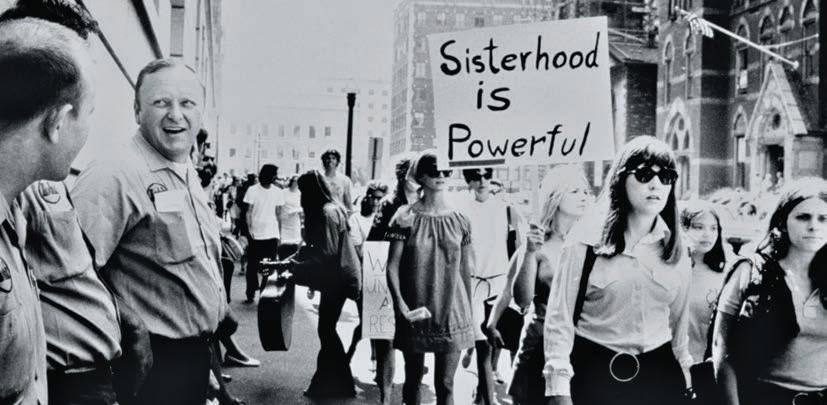
5 minute read
AL FRENTE UP FRONT
A PROBLEM FOR EVERYONE THE SAD PARADOX OF GENDER-BASED VIOLENCE
Women marching under a 'Sisterhood is Powerful' placard in the United States, while a group of male workers watch from the left, circa 1975. Photo by Michael Ochs Archives/Getty Images Mujeres marchando bajo una pancarta de "La hermandad es poderosa" en los Estados Unidos, mientras un grupo de trabajadores varones observan desde la izquierda, alrededor de 1975. Foto por Michael Ochs Archives/Getty Images
Advertisement
The hand is not the hand alone, nor does the foot walk alone. Contrary to what Thing, the character in "The Addams Family", showed, the hand only works because it is linked to all the other parts of the body. The hand cannot function in the same way if it is not in relation, hopefully harmoniously, to the eyelashes, liver and kidneys; and the clearest proof of this is when that balance is broken, as in advanced diabetes where amputation has to be chosen in favour of the other interconnections of the body. And all these elements, in turn, are composed of billions of cells that depend on each other.
This simple idea is the strongest argument against violence, says Judith Butler in an interview with The New Yorker: "When I do violence to another human being, I also do violence to myself, because my life is bound up with this other life."
The epidemic of feminicide that is sweeping the continent is not a problem of women or of the countries where it is most evident, like Mexico, but a problem for everyone. With the murder of each person, a series of links (relational, cultural, economic, etc.) are being undermined, which are fundamental to being who we are and indispensable in order to continue being.
That's why this time, in Women's Month, we've decided to focus our cover on two Latin American movements of collective mourning for violence
ENGLISH
against women and defense of life: the Chilean collective LasTesis, with its performance "Un violador en tu camino" ("A rapist in your way") and the National Women's Strike organized in Mexico by Las Brujas del Mar.
In both cases, both in the thousands of women who have sung "The rapist is you" and in the decision of the Mexican women to show their country what a world without them is like, there is a combative gesture that resists by all means to be violent. Even there, when revenge seems to make sense, and in this we still follow Butler's ideas.
They are combative, non-violent gestures because what they do is to take a step forward, a step that requires courage, strength, and energy, without their force being so excessive that it strikes again at the fabric of our relationships.
We rescue these two Latin American movements because they have been resolute in protecting relationships and life, as muscles contract and ache furiously to safeguard the wound.
We present them with pain for the dead women and for all the ties that were broken. With pain for the men and children who also live this violence, for the elderly, for the laughter and the lost stories, for the bonds that will no longer be. But also with hope, because it is in these gestures that we take care of our relationships and new possibilities are born.
La mano no es la mano sola ni el pie anda solo. Contrario a lo que mostraba Dedos, el personaje de “Los Locos Addams”, la mano sólo funciona porque está vinculada a todas las otras partes del cuerpo. La mano no puede funcionar de la misma manera si no está en relación, ojalá armoniosa, con las pestañas, el hígado y los riñones; y la prueba más clara de esto es cuando ese equilibrio se rompe, como ocurre en los casos de diabetes avanzadas en que hay que optar por la amputación en favor de las otras interconexiones del cuerpo. Y todos estos elementos, a su vez, están compuestos por miles de millones de células que dependen entre sí. Esta idea tan simple es el argumento más contundente que hay en contra de la violencia, dice Judith Butler en entrevista con The New Yorker: “Cuando ejerzo violencia sobre alguien también ejerzo violencia sobre mí misma, porque mi vida está unida a esta otra vida”.
La epidemia de feminicidios que azota el continente no es un problema de las mujeres ni de los países en que está siendo más evidente, como México, sino un problema de todos. Con el asesinato de cada persona se atenta contra una serie de vínculos (relacionales, culturales, económicos, etc.) fundamentales para ser quienes somos e indispensables para poder seguir siendo.
Por eso esta vez, en el mes de la mujer, hemos decidido centrar nuestra portada en dos movimientos latinoamericanos de duelo colectivo por la violencia a las mujeres y defensa de la vida: el colectivo chileno LasTesis, con ESPAÑOL
su performance “Un violador en tu camino” y el Paro Nacional de Mujeres organizado en México por las Brujas del Mar.
En ambos casos, tanto en los millares de mujeres que han cantado con desgarro “¡El violador eres tú!” como en la decisión de las mexicanas de mostrarle a su país cómo es un mundo sin ellas, hay un gesto combativo que se resiste por todos los medios a ser violento. Incluso allí, cuando la venganza pareciera tener sentido, y en esto seguimos las ideas de Butler todavía.
Son gestos combativos y no violentos porque lo que hacen es dar un paso adelante, un paso que requiere valor, fuerza y energía, sin que su fuerza sea tan desmedida que atente nuevamente contra nuestro tejido de relaciones.
Rescatamos estos dos movimientos latinoamericanos porque se han tenido firmes en la protección de las relaciones y la vida, como los músculos se contraen y duelen rabiosamente para salvaguardar la herida.
Los presentamos con dolor por las mujeres muertas y por todos los vínculos que se quebraron. Con dolor por los hombres y los niños que también viven esa violencia, por los ancianos, por las carcajadas y las historias perdidas, por las uniones que ya no serán. Pero también con esperanza, porque es en estos gestos donde cuidamos nuestras relaciones y nacen nuevas posibilidades.

THE BEAUTY OF STRENGTH


“Feminism and femininity are not mutually exclusive.” Chimamanda Ngozi Adichie, Dear Ijeawele, or a Feminist Manifesto in Fifteen Suggestions

"El feminismo y la feminidad no se excluyen mutuamente”. Chimamanda Ngozi Adichie, Querida Ijeawele, o un Manifi esto Feminista en Quince Sugerencias









